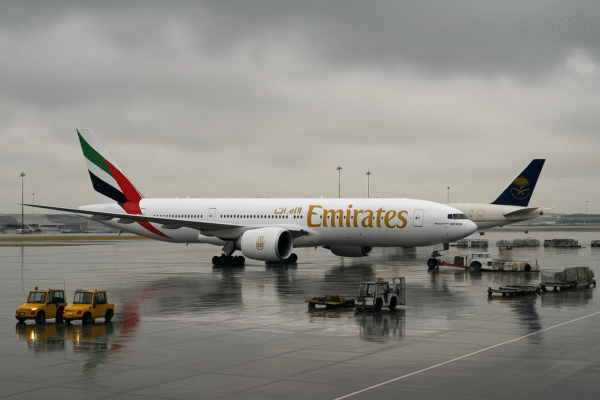Tourism in the Middle East has hit a major snag as Emirates and Saudia Airlines suspend key flights to top destinations—Dubai, Riyadh, Jeddah, and Dammam—due to severe weather and logistical challenges. The cancellations, reported on August 31, 2025, have left hundreds scrambling to rebook, disrupting both business and leisure travel across the region.
Extent of the Disruption
Several flights have been scrapped by both carriers. Saudia has axed three services, while Emirates has canceled two. On top of that, Saudia reports seven delays; Emirates has eight. The core of the problem appears to stem from unpredictable severe weather and mounting operational pressures. The result: long queues, frantic rebookings, and mounting traveler frustration.
Major Tourist and Business Destinations Impacted
- Dubai: As a global tourism magnet and premier transit hub, Dubai International Airport’s disruptions are particularly damaging. Travelers heading to its famed landmarks—Burj Khalifa, Dubai Mall, and desert tours—now face unpredictable delays.
- Riyadh: The Saudi capital, a rising business hub and event destination, is experiencing ripple effects as disrupted flights delay professionals attending conferences and government engagements.
- Jeddah & Dammam: Known for cultural landmarks and religious tourism, these cities are now seeing logistical snags and disheartened visitors due to sudden cancellations and rescheduling problems.
This widespread disruption affects not just individuals but also the broader tourism and business ecosystems that rely on stable air connectivity.
Why Flights Are Being Canceled
Severe Weather Conditions
The region’s sometimes harsh climate—sandstorms, heavy rains, and extreme heat—can severely degrade visibility and disrupt airport operations. Ground equipment may malfunction, and infrastructure may be overloaded, posing safety risks. Airlines attribute current cancellations and delays primarily to such weather disruptions.
Operational Complexities
Beyond weather, logistical shortcomings have taken a toll. Tight schedules, aircraft maintenance delays, crew shortages, and overbooking are among the contributing factors. The simultaneous spike in travel demand and resource strain has pushed airlines to cancel or reschedule flights to maintain broader network stability.
Impact Beyond the Flight Deck
Tourists planning beach getaways, sightseeing, or desert adventures face unexpected itinerary changes. In Dubai, major attractions are seeing visited interruptions. In Saudi cities, religious travelers and event-goers are bearing the brunt.
Business travelers, often on stringent schedules, risk missing meetings or conferences—impacting deals and professional commitments. The broader tourism industry—from hotels to restaurants, transport services to local tour operators—is bracing for financial and reputational fallout.
Travelers Should Do This Now
Passengers are advised to stay in close contact with their airlines and monitor flight statuses diligently. Airlines typically offer rebooking, refunds, or accommodations under exceptional circumstances.
Being proactive—checking weather forecasts, registering for notifications, and maintaining flexible plans—can help mitigate inconvenience. As the situation remains dynamic, being informed is travelers’ best tool.
In summary, the Middle East tourism landscape is grappling with a sharp disruption as Emirates and Saudia Airlines cancel multiple flights. Severe weather, ongoing operational hurdles, and heightened travel volume have converged to unsettle travel plans to key destinations like Dubai, Riyadh, Jeddah, and Dammam. Travelers should brace for delays, stay alert, and remain communicative with their carriers to navigate this unsettled period.
For more travel news like this, keep reading Global Travel Wire















